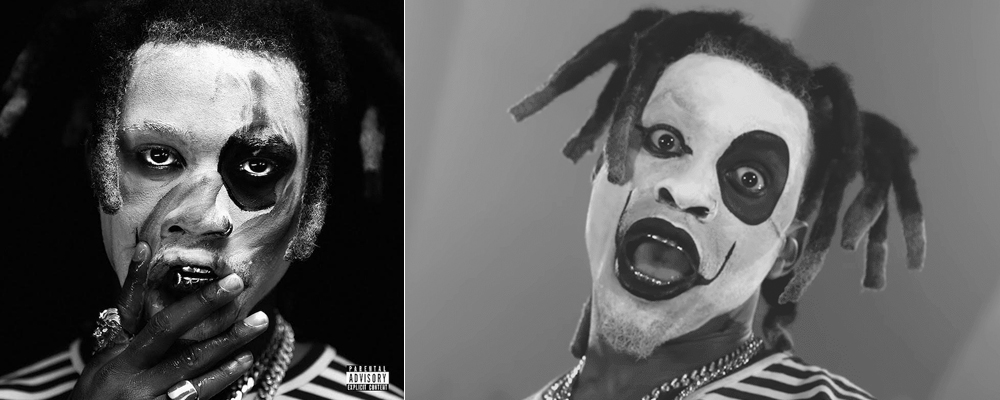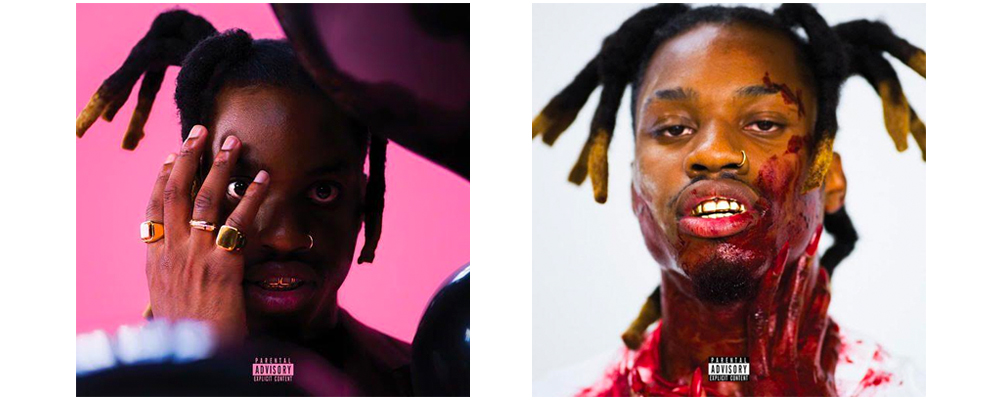Denzel Curry Plays by His Own Rules on Dark and Daring ‘TA13OO’
Adi Mehta
Miami rapper Denzel Curry creates what is often called “Soundcloud music,” a style that applies the lo-fi template, long embraced by bedroom producers, to hip-hop tracks. For a genre so largely defined by obsessions with flash and size, lo-fi aesthetics seem like a strange choice, which makes the music all the more novel and exciting. Curry’s latest record, “TA13OO,” is a concept album released in three installments over the span of a week, with each successive release representing a progressively darker state in the protagonist’s evolution. By far his most ambitious work, it showcases an immensely innovative artist elevating his art to unanticipated levels.
Although Curry has described the first third of the album as the “light” stage, he greets the listener, in the title track, “Welcome to the darker side of taboo,” making it clear that this is a dark undertaking altogether. Musically, it’s a rather breezy number, with Curry’s laidback swagger in both his rapping and singing recalling early Dungeon Family output. The subject matter, on the other hand, is beyond somber. Curry personifies “taboo” as a girl who has sustained abuse, and professes his commitment to protecting her. Taken literally, it begins the album with plenty baggage; broadly, it amounts to an embrace of all things taboo. On “Black Balloons” things get sonically more mellow and lyrically more grave. Curry puts the frivolous-sounding chorus of “Let it float, let it float” in context, describing it as “what’s said from Pennywise,” in reference to the murderous dancing clown from Stephen King’s 1986 novel “It.” This fits with the album’s cover art, which depicts a deranged Curry in smeared face paint, and suddenly the song takes on a very different meaning. Next is “Cash Maniac,” probably the most lighthearted tune, after which everything descends immediately and radically into the abyss. “Sumo” begins with a foreboding melody, and an onslaught of grimy, distorted bass, just below the threshold of bursting your speakers. Curry is in full gangster mode, rapping with an unprecedented ferocity that approaches a roar at times, backed by samples of Lil Jon’s hypeman screams. The track hits hard, launching you head-on into the album’s second phase.
Part two sets off with “Super Saiyan Superman,” a wonky, slivering, eerie underworld jam, picking up right where things left off, and segueing neatly into “Switch It Up,” which swells to even greater proportions with machine-gun snares and more Lil Jon samples. Curry’s rapping here is downright formidable, frenetically flowing in contorted cascades. He elaborates on the song title, describing abruptly shifting moods — perhaps a bipolar disorder. Fittingly, the following song, “Mad I Got It,” takes a lighter sonic turn, while still retaining some of the edge. The chorus here is one of the catchiest on the record. The lyrics, again, are weighty, this time concerning the topic of jealousy. Curry mentions another Stephen King character, as well as Jim Carrey’s part in 1994’s “The Mask.” By this point, one can clearly hear how such influences have shaped Curry’s gothic aesthetic and inspired his vivid, fantastical soundscapes.
“Sirens” delves into the political, tackling police officers’ abuse of power and media bias. Curry howls and roars on the mic, at one point adding new emphasis to Gil Scott Heron’s prophecy, with the line, “The revolution will never be televised.” Guest rapper J.I.D. emerges a true star on the track, spitting rapid tongue-twisters with effortless mastery. “Cloud Cobain” brings the the second act to a woozy culmination, with wobbling, flickering tones, overbearing bass bursts, and scattered, sliced snares. In a classic bit of hip-hop wordplay, Curry raps, “Suicidal doors, call it Kurt Cobain,” referring to the guillotine-like, vertical doors of Lamborghinis, and adding some levity to an otherwise bleak topic. In another catchy chorus, he sings, “I just wanna feel myself / You want me to kill myself.” While Curry broaches the typical hip-hop topics on this album, he’s decidedly less preoccupied with the usual megalomania and debauchery than most of his peers, and these lines likely voice an insistence to play by his own rules.
Whereas the relatively light first act saw “Black Balloons,” the third and darkest portion begins with “The Blackest Balloon.” We find Curry tormented by memories of his older brother who died in police custody, a recurrent topic in Curry’s work since day one. He also takes issue with the glorification of prescription drugs, referencing the death of Lil Peep. He has discussed, in interviews, how martial arts legend Bruce Lee’s books inspired him to quit hard drugs, and he devotes the following track, “Percs,” to passing the word along in the most manic manner. He calls out generic rappers and face-tated posers with frenzy and fury, taking it upon himself to call out the bullshit. Upon “Revenge” it all descends into full horror rap territory, in the style of Three Six Mafia — or rather, Necro, with Curry rapping about chopping up body parts. The psycho killer depicted on the album cover has finally been pushed to the edge, and the results are chilling. The climactic closer, “Black Metal Terrorist,” fittingly begins with the line, “Finish ‘em Zel.” A sure sonic highlight, it features a melody seemingly shaped from the sound of swiveling doors. There’s plenty discordance, and commands of “Send ‘em to hell,” and by the end, you should be rather terrified. “Terrorist” seems like a bit of a poor choice for the title, but then again, the album is called “TA13OO (Taboo.)”
Overall, “TA13OO” is one weird album — dark, daring, and somewhat devastating. Make of it what you will, but you’ve got to hand it to Curry. Even the most devoted hip-hop heads would probably agree that rap today is not exactly leading the way in turning out groundbreaking content. Notable novelties occasionally slip under the radar, but albums like this come once in a blue moon. Elaborate release schemes and marketing ploys are a dime a dozen (Kanye West, Rae Sremmurd,) so an album in three installments is, itself, nothing so special. However, the density of the work, the madcap stylistic and conceptual daring, and the versatility and skill showcased, set Curry apart as one of the most exciting new voices in hip-hop.
“TA13OO” is available July 27 on Apple Music.


